The first stop of my journey, after a three-day, 900 mile drive from southern California through the fried and baked Nevada desert and the bare, vaulted geologic skeletons of Utah, is Baggs, Carbon County, Wyoming. Just a few miles over the Colorado-Wyoming state line, I crest a hill on the two-lane and laid out below, a swath of emerald Ireland has been pasted, east to west, into the open western range. The Little Snake River flows into the Yampa which empties into the Green before the mighty merger with the Colorado. Water in the West is God.
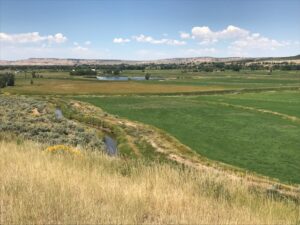 The little town of Baggs sits on the river, plush shag carpets of thick green pasture and feed land, wetlands with birds and willows, small retention ponds and ditches carrying the precious water to fields and irrigation systems. There are three color palettes on display in this early September: green flat bottomlands; tawny brown and dusky sage on the gently sloping rangeland; and darker, buckskin brown and piney greens up on the mountains that, six weeks from now, will be adorned with splashes of heartbreakingly brilliant gold before the quaking aspens drop their leaves for the long, deep Wyoming winter.
The little town of Baggs sits on the river, plush shag carpets of thick green pasture and feed land, wetlands with birds and willows, small retention ponds and ditches carrying the precious water to fields and irrigation systems. There are three color palettes on display in this early September: green flat bottomlands; tawny brown and dusky sage on the gently sloping rangeland; and darker, buckskin brown and piney greens up on the mountains that, six weeks from now, will be adorned with splashes of heartbreakingly brilliant gold before the quaking aspens drop their leaves for the long, deep Wyoming winter.
You’ve never heard of Baggs? Most of the folks in this valley are quite happy about that. They live in a little bubble where, with hard work, they raise cattle and children and pray that the river flows.
Linda Fleming is the unofficial historian of Baggs. She was also mayor, the first woman to sit on a number of councils and boards, and the first woman from the area to go to college. She taught science for decades at the high school.
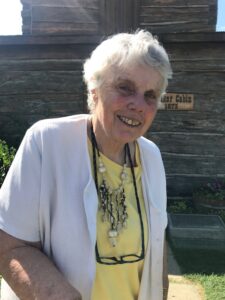 “I’m 81 years old. We used to say that my grandfather was the first white or European child born here, but that’s not true. I think he was about 3rd. That was in 1883. His wife, my grandmother, they were from Missouri. She walked all the way behind a wagon kicking milk cans, and they ended up here, too.”
“I’m 81 years old. We used to say that my grandfather was the first white or European child born here, but that’s not true. I think he was about 3rd. That was in 1883. His wife, my grandmother, they were from Missouri. She walked all the way behind a wagon kicking milk cans, and they ended up here, too.”
“We are a very homogenous community. Very white, I would say, lower middle class. Even today, I don’t think we know what we don’t have. I was the first of the grandchildren in my family to go to college. I’ve served on the Wyoming Humanities Council, and other groups that speak to diversity, are not always well received here. We got grants for the community library a few years ago. But from the Wyoming Humanities Council for book discussion, their books were often about minorities or immigrants, or somebody hitchhiking across the country, broke, and all that type. When we’d have our book discussions, there’d be people, ‘Well, I’m just kind of angry. These are the worst books you’ve ever heard of, and why are we reading this?’”
Cindy Cobb teaches 3rd grade over at the school. So, uninvited, I walked into the school and asked the first adult I saw if I could interview Cindy, and a few minutes later she was there.
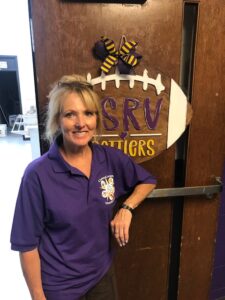 “This is my 40th year teaching in the same classroom. We have a family ranch. It’s been in our family for 135 years.We are the seventh generation on it. And the most important thing we need to teach kids is a work ethic. We have to teach kids how to work.”
“This is my 40th year teaching in the same classroom. We have a family ranch. It’s been in our family for 135 years.We are the seventh generation on it. And the most important thing we need to teach kids is a work ethic. We have to teach kids how to work.”
“We hold our kids to a higher standard. I was held to a high standard growing up, and I want my kids to be held to that. In this valley, everyone’s watching. So if something happens, oh, everyone talks about it. It’s everyone’s responsibility. We look out for each other and each other’s kids. It’s a village. It takes a village, and we have this village.”
“We’re the stewards of the land, we take care of the land for wildlife and for our own animals. Ranchers just do that. It’s just bred into us. We’re part of the Colorado River water system. We’ve had meetings this summer about water usage. We are the headwaters. We have our water rights, but I’m afraid one of these days water rights won’t matter because there just is not enough water. I used to show my kids a movie years ago called Water’s More Precious Than Oil. They were talking about over in Africa. But we are there right now. We are there.”
Nikki Devlin is a newcomer; she and her husband, a state trooper, moved here about ten years ago. Nikki does not like the crowds and pace of big cities.
“I’ve seen people come, and they tried to change things way too fast. It was more of I’m right, and you’re wrong.They were trying to push various beliefs. Everyone here is like, ‘but the way we do it works just fine, might be a little slower, but we do it and it works well. Don’t tell me I’m wrong. When there’s a million different rights, don’t tell me I’m wrong.’ I can’t say they’re scared of change, but they’re skeptical and they want to look at it, think about it, and then move forward.”
“I think we agree on a lot of the stuff that is really important in life, but we somehow get stuck disagreeing on the little things. We just never seem to sit down and talk together with people from different backgrounds like I am doing with you right now.”
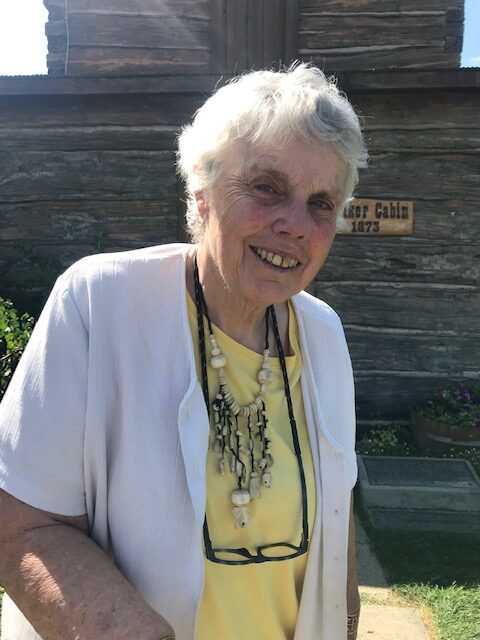


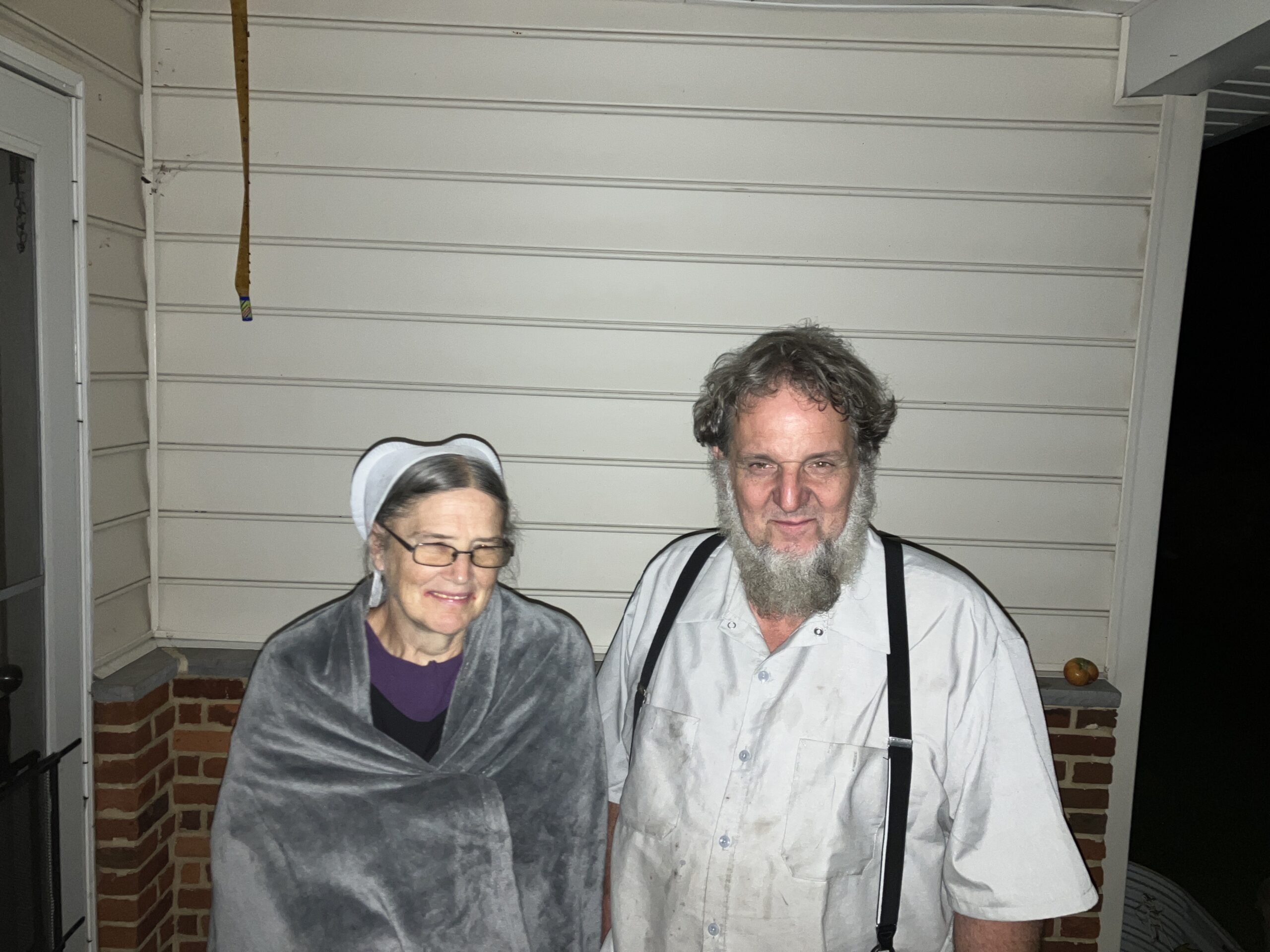









A lot of good stuff in there, Grant. Thanks for doing this. I’m fascinated…and invested.